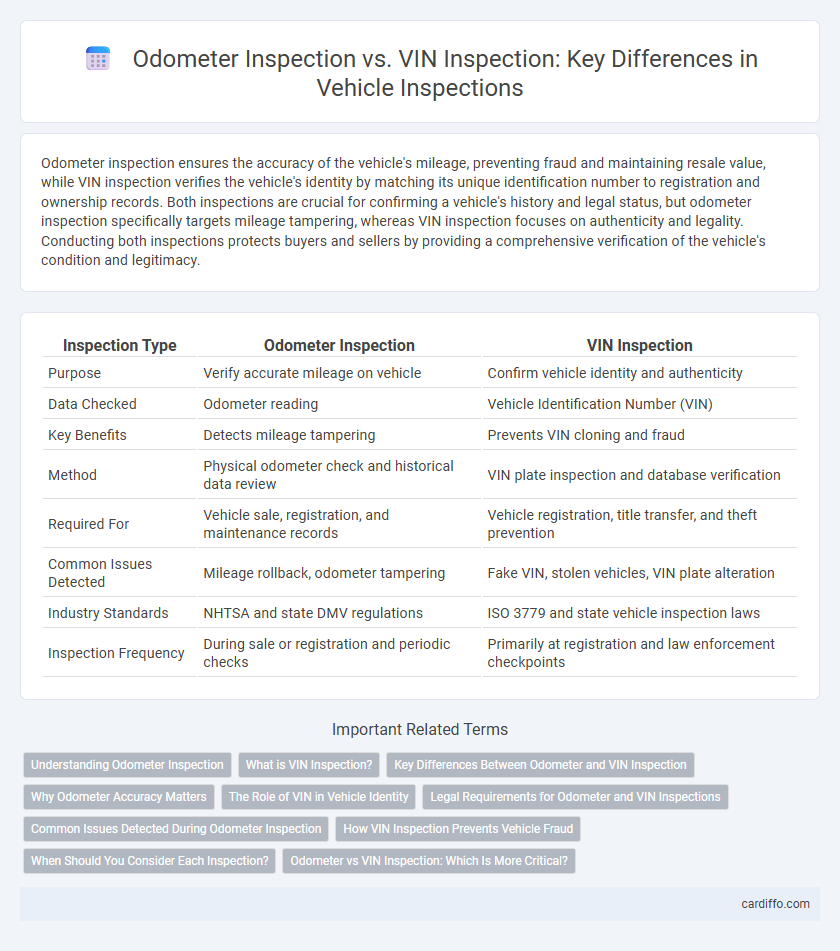Odometer inspection ensures the accuracy of the vehicle's mileage, preventing fraud and maintaining resale value, while VIN inspection verifies the vehicle's identity by matching its unique identification number to registration and ownership records. Both inspections are crucial for confirming a vehicle's history and legal status, but odometer inspection specifically targets mileage tampering, whereas VIN inspection focuses on authenticity and legality. Conducting both inspections protects buyers and sellers by providing a comprehensive verification of the vehicle's condition and legitimacy.
Table of Comparison
| Inspection Type | Odometer Inspection | VIN Inspection |
|---|---|---|
| Purpose | Verify accurate mileage on vehicle | Confirm vehicle identity and authenticity |
| Data Checked | Odometer reading | Vehicle Identification Number (VIN) |
| Key Benefits | Detects mileage tampering | Prevents VIN cloning and fraud |
| Method | Physical odometer check and historical data review | VIN plate inspection and database verification |
| Required For | Vehicle sale, registration, and maintenance records | Vehicle registration, title transfer, and theft prevention |
| Common Issues Detected | Mileage rollback, odometer tampering | Fake VIN, stolen vehicles, VIN plate alteration |
| Industry Standards | NHTSA and state DMV regulations | ISO 3779 and state vehicle inspection laws |
| Inspection Frequency | During sale or registration and periodic checks | Primarily at registration and law enforcement checkpoints |
Understanding Odometer Inspection
Odometer inspection ensures the accuracy of a vehicle's mileage to prevent fraud and protect buyers by verifying that the mileage reading matches the vehicle's condition and history. This process typically involves comparing the odometer reading with documentation such as maintenance records, previous inspection reports, and manufacturer data. Accurate odometer inspection is crucial for assessing a vehicle's true value and maintaining its resale integrity.
What is VIN Inspection?
VIN inspection involves verifying a vehicle's unique 17-character Vehicle Identification Number to confirm its identity and history. This process ensures the VIN on the vehicle matches registration and title documents, preventing fraud and theft. VIN inspections are essential for title transfers, registrations, and verifying a car's legitimacy.
Key Differences Between Odometer and VIN Inspection
Odometer inspection verifies the accuracy of a vehicle's mileage to detect tampering or rollback, ensuring reliable mileage records, while VIN inspection confirms the vehicle's identification number for legal ownership and theft prevention. Odometer inspections focus on mechanical and electronic components affecting mileage readings, whereas VIN inspections involve checking physical VIN plates and matching them with registration documents. Both inspections serve critical roles in vehicle history validation but target distinct aspects of vehicle authentication and title integrity.
Why Odometer Accuracy Matters
Odometer accuracy is crucial for ensuring the true mileage of a vehicle, directly impacting its resale value, maintenance schedules, and safety assessments. While VIN inspection verifies the vehicle's identity and history, odometer inspection confirms the accuracy of the mileage recorded, preventing fraud and odometer rollback scams. Accurate odometer readings help buyers make informed decisions and support regulatory compliance in vehicle transactions.
The Role of VIN in Vehicle Identity
The Vehicle Identification Number (VIN) serves as a unique identifier that verifies a vehicle's make, model, and history, playing a crucial role in vehicle identity during inspections. Unlike odometer inspections that focus on verifying mileage accuracy to prevent fraud, VIN inspections confirm the authenticity of a vehicle by matching the VIN against official records. Accurate VIN inspections are essential for tracking ownership, ensuring compliance with regulations, and detecting stolen or tampered vehicles.
Legal Requirements for Odometer and VIN Inspections
Legal requirements for odometer inspections mandate accurate mileage verification to prevent fraud and ensure vehicle history integrity, typically enforced during title transfers and sales. VIN inspections confirm vehicle identity and authenticity, verifying that the vehicle's identification number matches registration and ownership documents to combat theft and illegal modifications. Both inspections are critical for compliance with state regulations and help maintain transparent vehicle records.
Common Issues Detected During Odometer Inspection
Common issues detected during odometer inspection include odometer rollback, inconsistent mileage records, and tampered or replaced odometer units. Inspectors also frequently uncover discrepancies between the odometer reading and vehicle maintenance or title records, which may indicate fraud. Identifying these issues is crucial to prevent inaccurate vehicle valuation and ensure transparency in used car transactions.
How VIN Inspection Prevents Vehicle Fraud
VIN inspection prevents vehicle fraud by verifying a vehicle's unique identifier against official records to detect stolen or cloned vehicles. Unlike odometer inspection, which primarily ensures accurate mileage reporting, VIN inspection confirms the authenticity of ownership and vehicle history. This process reduces the risk of title washing, odometer rollback, and counterfeit vehicle identification, enhancing overall buyer protection.
When Should You Consider Each Inspection?
Odometer inspection is essential when verifying vehicle mileage accuracy to prevent fraud during sales or lease returns, especially for used cars with unclear or suspicious history. VIN inspection is necessary when confirming a vehicle's identity for registration, title transfer, or after repairs to ensure the VIN matches official records and no tampering has occurred. Choose odometer inspection primarily for mileage verification, while select VIN inspection for legal compliance and vehicle authenticity.
Odometer vs VIN Inspection: Which Is More Critical?
Odometer inspection verifies a vehicle's accurate mileage to prevent fraud and ensure proper valuation, while VIN inspection confirms the vehicle's identity and history. Odometer inspection is more critical for assessing wear and potential maintenance issues, whereas VIN inspection is essential for verifying vehicle authenticity and legal status. Prioritizing odometer accuracy is vital for buyers focused on vehicle condition, while VIN inspection safeguards against theft and title discrepancies.
Odometer inspection vs VIN inspection Infographic

 cardiffo.com
cardiffo.com